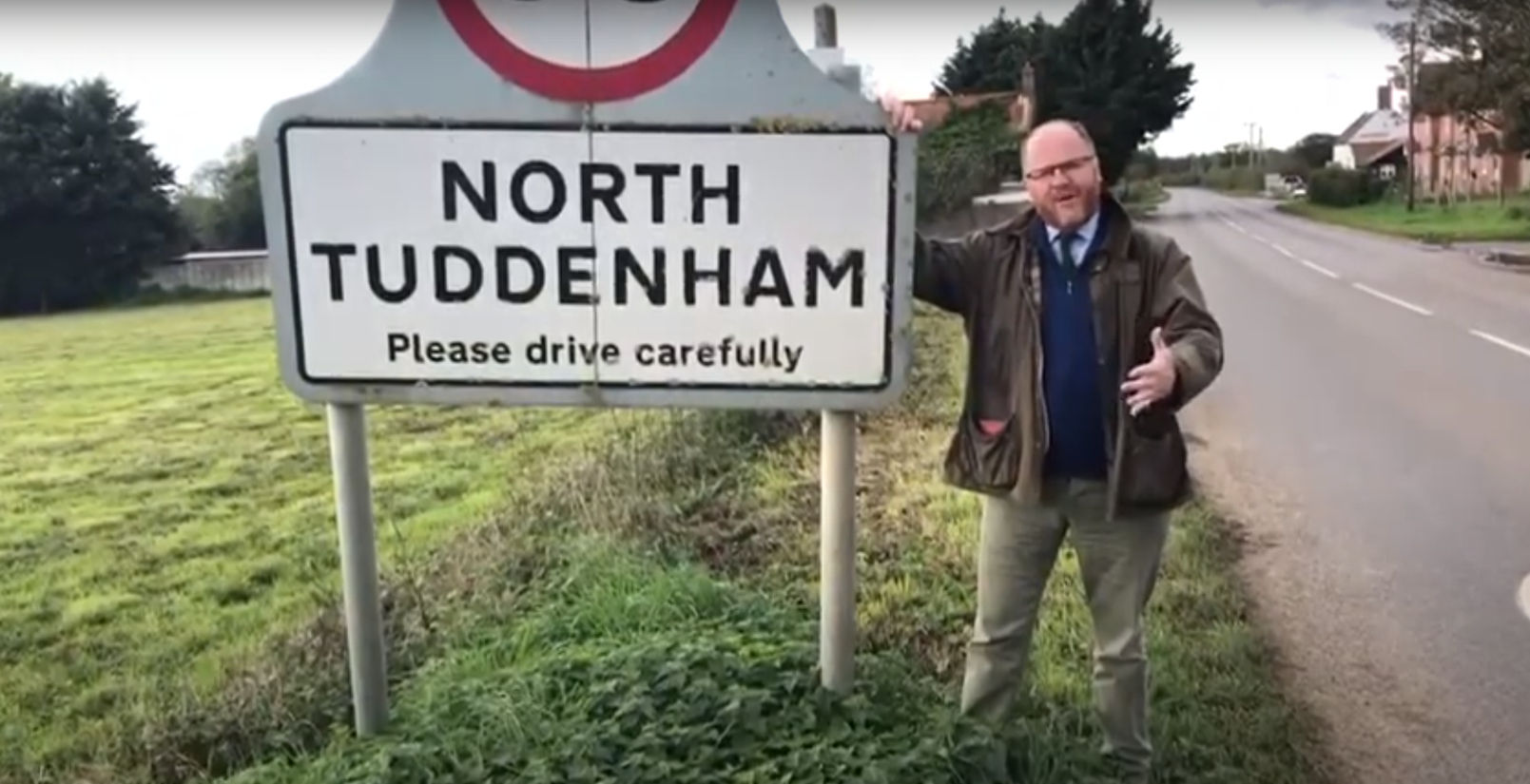Our region is ideally placed to play a frontline role as the UK embraces the ‘Green Revolution’ and takes its place as a ‘Science Superpower’.
All of our market towns face the familiar challenge of balancing new growth and development with the needs of the communities living in, and around, them – all the while preserving the unique rural heritage and way of life that we all cherish, and that makes our part of the world such an attractive place to visit.
Covid has only heightened that already difficult challenge – and that’s why I welcomed the opportunity to virtually meet with Breckland and the Hatch consultancy team they have employed to help produce their “Future Breckland” Plans for each of the district’s market towns.
Having worked closely with the Town Councils of Attleborough, Dereham and Watton over the years, I shared some of my insights on what the process should focus to address – and am pleased that so many local stakeholders are going to be approached and included as the Future Breckland Plans are developed.
I truly believe that, with our region about to become the centre of the UK’s ‘Green Revolution’ – home to thousands of the jobs of tomorrow and improved connectivity, bringing prosperity and a cleaner, greener, healthier way of life for us ALL, we have the opportunity to set out a proper vision of Mid Norfolk – one where we are a thriving hub of vibrant communities.
I look forward to doing all I can to support our local Town Councils as they engage with this process, and to continuing my conversation with Breckland themselves.
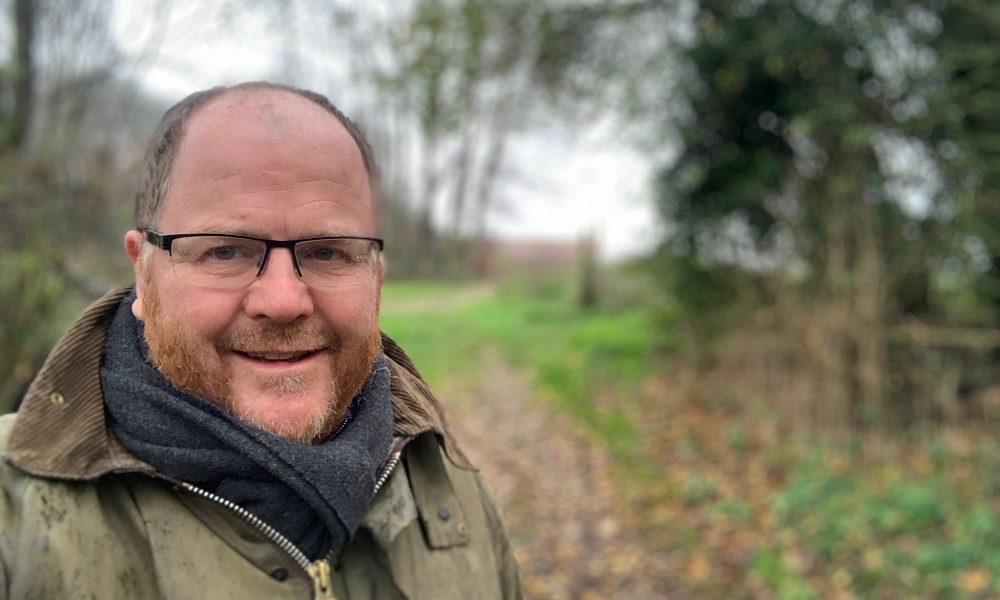
For decades, successive governments have underfunded our transport network here in the East – which is why one of my central missions as an MP has been the improvement of our transport infrastructure in this region, and why I so greatly welcome the Prime Minister and Government’s commitment to “levelling-up” the places that have for too long been “left-behind”.
Much good work has been done over the years (including the commitment of £300 million for the first stage of A47 dualling and the dualling of the A11) and I am tremendously proud to have played my part. There is still a long way to go however, if we are to create the transport network that Norfolk, and the East, need in order to unlock their true economic potential.
That’s why I was delighted to join today’s Transport East meeting – with parliamentary colleagues and local council representatives from across Norfolk, Suffolk and Essex.
There is a clear shared vision for our region – one that will bring growth and prosperity, and connect our people in a way that allows them to fully embrace the ‘Green Revolution’ and the exciting jobs of tomorrow.
By speaking with one united voice, we can work together to make sure our region gets the transport improvement it desperately needs and deserves.
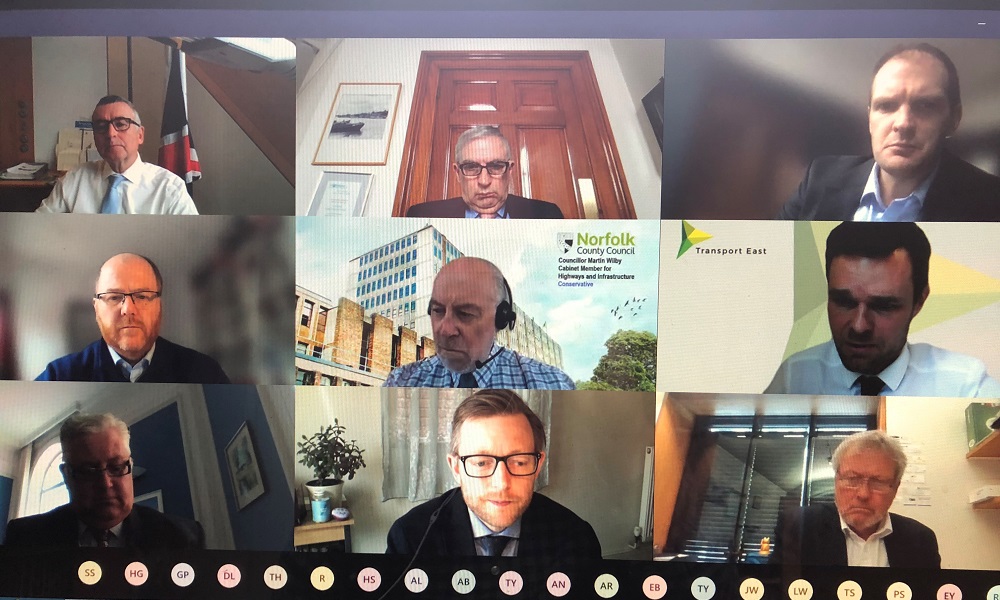
The Queen’s Awards for Enterprise are one of the most prestigious UK business awards, designed to recognize outstanding achievements in the fields of Innovation, International Trade, Sustainable Development and Promoting Opportunity (through social mobility).
That’s why I was particularly delighted to see 3 award winners in Mid Norfolk this year.
Benefits such as global recognition, increased sales and growth, access to new markets, promotional opportunities, and increased staff morale are all part of this great award.
So, a huge well done to Cobalt Aerospace Limited in Hingham, who won awards in the International Trade and Innovation categories, and Ansible Motion, who won the International Trade Award for outstanding short-term growth. Their teams can be immensely proud.
Having spent fifteen years before coming to Parliament working with and helping to finance small, science start-ups in and around East Anglia, I can see the huge potential of Life Science, Clean-tech, Agri-tech and Med-tech in East Anglia.
Our region is ideally placed to play a frontline role as the UK embraces the ‘Green Revolution’ and takes its place as a ‘Science Superpower’ – and, located between the Cambridge Science and Innovation Cluster and the Norwich Research Park, with Hethel Engineering nearby, Mid Norfolk will be at the heart of the jobs and prosperity of tomorrow.
That’s why I continue to do what I can to help young scientists from our area, and across the UK, learn how they can best engage with politicians to get their research heard at the highest levels.
With fantastic research like the development of the blight-resistant potato being pioneered in this country (just down the road at the NRP!), we need to make sure it’s getting the attention it deserves – and being utilised to make ALL of our lives better.
I was therefore delighted to join Sense about Science’s policy panel yesterday to share my insights on how scientists can better promote their work in Westminster – with students from across the country.
I look forward to continuing my support for them – to empower the voice of this vital, high growth industry.
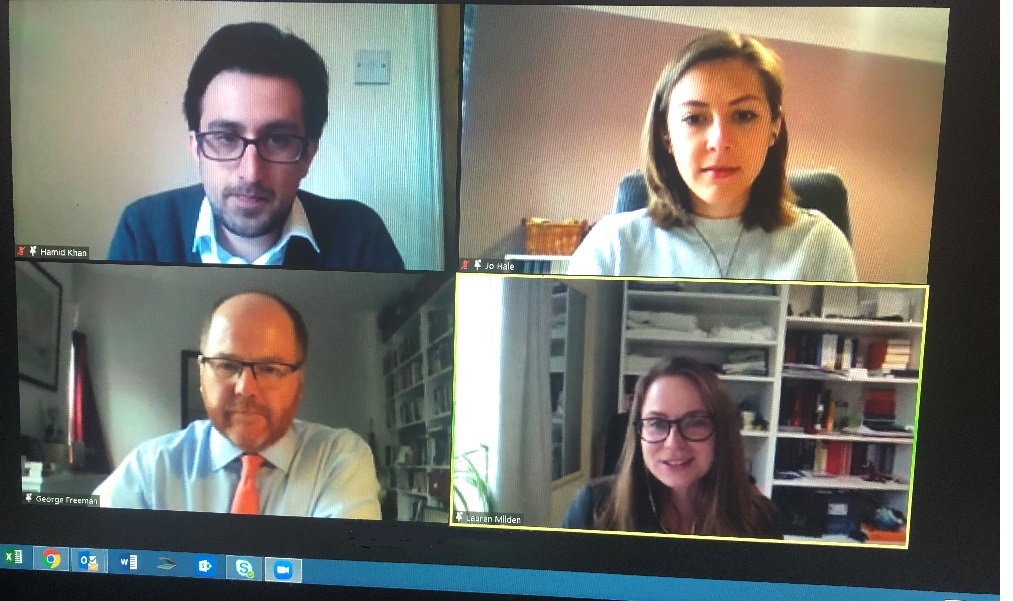
George Freeman welcomes measures in the Queen’s Speech that set out a framework for the UK to lead in innovation across new sectors such as life sciences, clinical trials, digital health, agri-tech, nutraceuticals, the decarbonisation of transport, mobility as a service, satellites, and scale-up finance in the City.
4.21pm
George Freeman (Mid Norfolk) (Con) [V]
It is a great pleasure to follow the hon. Member for Chesterfield (Mr Perkins) on behalf of the people of Mid Norfolk, and to speak a little more optimistically and positively about this country and its future, and reject the narrative of doom and gloom from the Opposition Benches.
In particular, it is a pleasure to follow my right hon. Friend the Chancellor at the end of a year in which he has inherited a crisis like no other, and, in the eyes of my constituents, passed the test with flying colours by announcing with speed last year a commitment to “do whatever it takes” and to take unprecedented measures to ensure that this country comes through the pandemic.
It is in no small part due to the Treasury’s commitment —to the 9 million people in employment the Treasury has helped and the 2.7 million in self-employment; with the tens of billions of pounds for small and medium-sized companies, and the £407 billion of relief moved at pace to support our economy—as well as the genius of our life sciences sector and the huge success of the Government’s vaccination programme that we are now in a position to lead the recovery post pandemic. It would be nice to hear Opposition Members at least pay some tribute to some of that extraordinary leadership this year. The polls last week show where the public have their trust, and the Opposition would do well at least to acknowledge that the Government are dealing very well with a historic crisis.
I particularly welcome the announcements on science in the Queen’s Speech, including the £22 billion commitment and the creation of our new Advanced Research and Invention Agency. I also welcome the skills guarantee, so that everyone around the country has a chance to take part in the new economy that we are creating, and the commitments to go further and faster on infrastructure.
I mentioned the figure that the covid crisis has cost us: £407 billion has been the total Government support, although the total cost will be much higher. I wanted to address the real question that we must all face: who pays for this debt? It is simply not fair for us to bequeath the debts of this crisis to the next generation, and that means it is incumbent on us to find the mechanisms to drive up prosperity, growth and opportunity. As we leave the European Union and take sovereignty over our regulatory and trade powers, it is important that we grip that opportunity and unleash the full genius of British science, innovation and engineering to create new sectors and new jobs.
Earlier this year I was delighted that the Prime Minister asked me and my right hon. Friends the Members for Chingford and Woodford Green (Sir Iain Duncan Smith) and for Chipping Barnet (Theresa Villiers) to lead a taskforce on innovation, growth and regulatory reform. We reported this week and our recommendations go to the heart of the measures in this Queen’s Speech—a new framework for regulation in the UK to be able to lead the world in the regulation of new sectors, and to use regulation to lead in innovation across the life sciences, clinical trials, digital health, agri-tech, nutraceuticals, the decarbonisation of transport, mobility as a service, satellites, and scale-up finance in the City. If we make such reforms, we can create here in the UK a genuine innovation nation—a small country, yes, but one that punches above its weight in developing the clean-tech, agri-tech and med-tech solutions that the world desperately needs as it faces an agricultural and industrial revolution in the next 30 years like the one we led here more than 200 years ago.
All that will be good not just for Britain but for local communities, because new sectors of growth create clusters right throughout the country—from hydrogen in Aberdeen to plant breeding in Aberystwyth and immunotherapies at Queen’s University Belfast. The Queen’s Speech is a speech for opportunity, regeneration and recovery as one nation, strengthening the Union and creating opportunities for people whoever and wherever they are. On behalf of the people of Mid Norfolk, I strongly commend it to the House.

Flooding has long been a concern for many in our part of Norfolk – but the heavy rainfall of December 23rd-24th 2020, and again in the early part of 2021, resulted in a record number of call outs for Anglian Water, the Environment Agency and Norfolk County Council alike, exacerbating these long held frustrations and fears.
Many saw their gardens and homes flooded with surface rain water and, sometimes, raw sewage. Many more reported being unable to use toilets and showers as drainage systems and nearby pumping stations were overwhelmed. Sadly, in most cases, it was the second/third/fourth time this had happened in the previous year (following similar flooding in previous years) and, quite understandably, people are at the end of their tether – feeling hopeless, and angry and distrustful of the local agencies that take their money, but provide a service well below the standard promised and which would be reasonably considered acceptable.
That’s why I decided to band together with local councillors in some of the most affected communities, and bring together community groups and officials of NCC, Anglian Water and the Environment to form a Mid Norfolk Flood Partnership – an open forum in which specific flooding issues, historic wider issues and how the system for responding to and mitigating flooding events needs improving.
The MNFP pulled together a 14 point letter that was among the very first submissions to Lord Dannatt (then Chair ofthe Norfolk Strategic Flooding Alliance) – and since then, we continue to lobby hard for assistance and reform.
We were delighted when the NSFA’s first recommendations included most of the 14 points that we had ourselves suggested in our letter to Lord Dannatt. The NSFA’s news that they would tackle ‘tranches’ of the worst affected communities was also greatly welcomed – with the first tranche including 16 towns and villages hit especially hard (of which 6 were located in Mid Norfolk). This came as a tremendous relief – and, following Lord Dannatt’s assurance that further tranches would follow, I have welcomed subsequent announcements of targeted support for other communities with specific issues in the years since(including additional targeted support packages for the likes of Dereham).
However, the terrible flooding caused by storms in October and November 2023 reminded us once again that we must not be complacent. Together with the MNFP, I continue to actively campaign on these issues and am determined to do all I can (both in Norfolk and in Westminster) to ensure the statutory flooding authorities and their wider partners are fully aware of the devastation flooding causes, and that they accelerate and upscale their efforts to improve flooding response and water management, as well as strengthen flood resilience.
In Westminster, I have raised the inadequacies of outdated riparian ownership legislation and highlighted again the need for greater emphasis to be placed upon flooding and drainage in the planning process. We cannot have households across Mid Norfolk continuing to be repeatedly flooded. We need a clearer set of legal obligations – with fines if necessary to fund compensation and remedial work – on large scale developers, on the Environment Agency, on water companies and any negligent landowners to ensure that they properly design and maintain drain infrastructure, and have a legal duty to fix issues that arise when they haven’t done so.
One of the reasons for stepping back from the Government frontbench was to have more time here in Mid Norfolk to help tackle this. And to be able to introduce a Bill/legal reforms to the necessary planning rules to get this fixed.
Rest assured, I will keep on this – working with partners to ensure Mid Norfolk’s voice is being heard at the very highest levels and that we see the improvements needed.
This page is dedicated to this campaign, and you will find each update I provide on this issue..

Although not opposed to the principle of having a new Weather Radar Tower in my constituency, since day one I have had concerns about the Met Office proposals to build one at the Anglian Water site in Old Buckenham.
At the start of 2020, I supported local concerns about the potential impact of the Tower on the nearby Old Buckenham Airfield (a major tourist asset in our part of the world) and offered to work with the Met Office to find another, more suitable location in Mid Norfolk. Sadly, the Met Office did not take up that offer – but, thankfully, the application was not successfully carried through.
When the Met Office attempted to bring a second (very slightly!) altered application forward again earlier this year, I wrote to Breckland for a second time to highlight my concerns and support the local community.
I am delighted to report that, earlier today, Breckland Council’s Planning Committee rejected the application in its current form – listening to the arguments put forward by so many.
Should the Met Office look to bring forward another application for this weather radar, my offer to work with them to find a more suitable location still stands.
To read more, please click here
To read the EDP article, please click here
Campaign Overview - Background
As a long-time advocate of the move towards renewable energy, I am a major supporter of Offshore Wind Energy – and have previously worked with local communities to ensure that the associated onshore infrastructure is located in the right place.
Between 2010-2013, I attended a number of public meetings in Little Dunham to listen to local concerns about Dudgeon’s proposals to build a new substation on top of a hill in the village – a location that would have meant it was an eyesore for several other communities in the area. By working tirelessly together, we managed to agree with Dudgeon that the substation would instead be located at a low-lying site in nearby Necton and, therefore, avoided any long term disillusionment with offshore wind energy in the area. (To read more click here, here and here).
That’s why, when I became aware back in 2017 that Vattenfall UK were hoping to build the two substations for their proposed Norfolk Vanguard and Norfolk Boreas offshore wind farms in Necton also, I was optimistic about working with them to negotiate a compromise with the community that would see the substations situated in the right place, and in return for substantial community benefits to compensate the local villages for the massive impact and disruption that they would face. (Read more here)
(From my conversations with residents and councillors in the village, the number one issue that always comes up is the horrendous A47 Necton/Dunham junction and the urgent need for improvements to be made there. It was my hope to persuade Vattenfall that this should form the basis of a package of benefits for the village – should their applications eventually prove successful)
Unfortunately however, such compromise has not yet been possible. Despite a willingness by the local community to engage in conversations on the appropriate siting of the substations in the village, Vattenfall continued to respond to any such overtures by simply stating that their choice is based on the extensive consultation that has been carried out.
Having attended the site myself on several occasions over the past few years (see here), I can firmly understand the widespread confusion as to how Vattenfall have come to the decision to choose this location. Again, it is situated on top of some of the highest land in the area and will see two structures each about the size of Wembley Stadium constructed, if approval is granted by the Secretary of State. This means they would not just be visible to Necton, but five other villages too! It makes no sense!
Compounded by Vattenfall’s poor response to queries from the public, their decision not to engage at this time with local representatives regarding community benefits (on the basis of Scottish guidance) and their decision to stop attending the meetings I regularly convene with local community representatives, this has created a consensus in Necton and the surrounding villages that Vattenfall have deliberately designed their consultation to be a sham “tick-box” exercise that, while meeting the Planning Inspectorate/Secretary of State’s required standards, manages to largely ignore the opinions of local people.
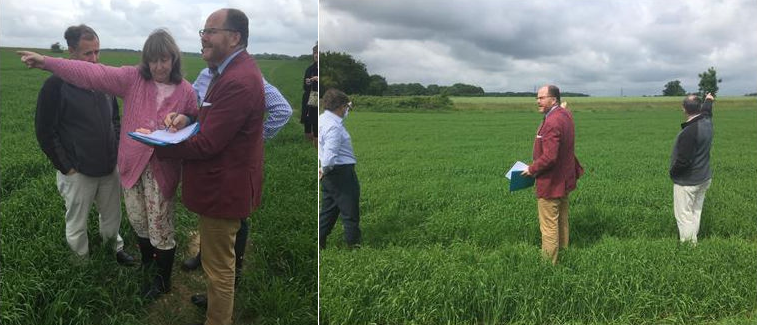
George joining local landowners for a site visit at the site in Necton.
Vattenfall’s actions made it hard not to believe they felt they could bulldoze through their proposals by exploiting the fact that Nationally Significant Infrastructure bypasses the typical local planning processes.
That’s why I continue to actively support the local communities in their opposition to Vattenfall’s proposals in their current form by encouraging them to set up a Taskforce that could liaise with me, and coordinate the efforts of local people.
(To read more on some of the representations that I have submitted to the Planning Inspectorate, and others, on behalf of the local community, please see links here with regards to their Norfolk Vanguard application: Relevant Representation, Letter to Breckland concerning Plane Crash site, Written Representation, Further Plane Crash concerns, Post-Hearing Submission and Concerns regarding Vattenfall's conduct. Please see links here with regards to their Norfolk Boreas application: Relevant Representation and Written Representation.)
It is also why I committed to securing debate in Westminster to highlight the wider policy matter in question.
Unfortunately, the initial date I had secured for a debate had to be postponed in order so that I could personally voice my concerns with the current proposals being put forward by Vattenfall at the Planning Inspectorate’s Open Floor Hearing in Norwich. (Read more here)
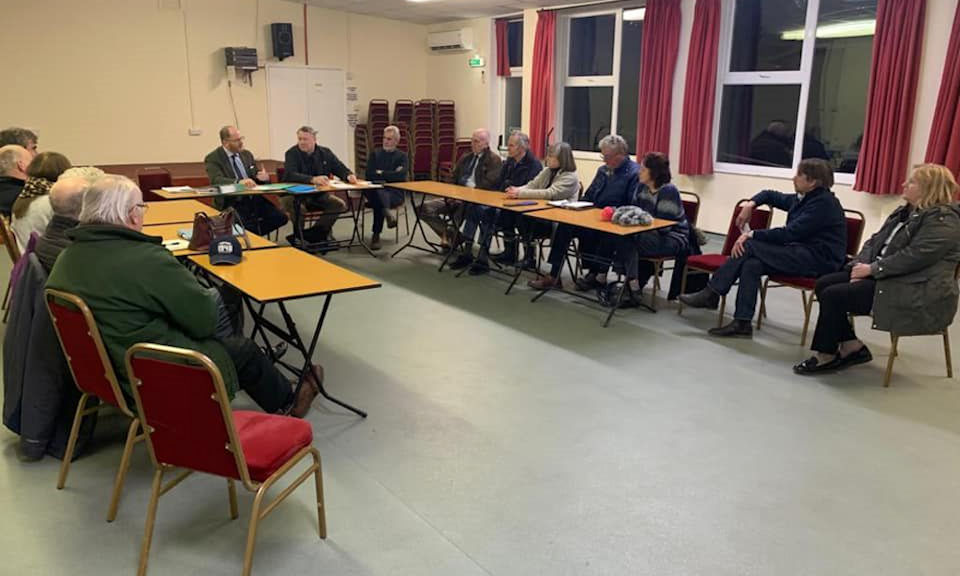
George meets with members of the local Taskforce.
I was delighted, however, to be able to secure a rearranged date for the debate in March – at which the then Minister of State for Energy and Clean Growth responded to the points being raised. (You can watch the full debate here).
With at least another dozen offshore wind farms likely to be built off the Norfolk/Suffolk coastline, the East of England is to become the “epicentre” of this industry in our country and I was pleased the debate received the support of a number of other MP’s from across Norfolk and Suffolk.
To bring the electricity produced onshore, National Grid are proposing that each one has its own cabling and its own substation. This is bonkers. It is obvious to just about everyone who has looked at this that there ought to be an Offshore Ring Main with one or two connections onshore to the Grid - paid for by the consortia behind the farms (which are all heavily subsidised by taxpayers).
I am delighted that the local press has been looking at this idea in further depth. (See here)
Whilst I support offshore renewable wind energy and recognise the huge boost it will represent to our economy here in the Eastern region, it is vital that the cabling and connectivity infrastructure is properly planned: to maximise efficiency, reduce waste and cost, and to avoid unnecessary landscape, environmental and economic disruption across our county.
That’s why I backed a petition that was launched in August 2019 calling for all offshore windfarms to be made to connect to the Grid via an Offshore Ring Main. (To read more and to sign this, a link to the petition can be found here).
It’s also why I met with the then Secretary of State for Business, Energy and Industrial Affairs, the Rt Hon Andrea Leadsom MP, in the Autumn to make the strong case for an urgent Review of the options for delivery offshore wind infrastructure in the East – particularly the option of an ORM. I was very pleased that she agreed to look at such a Review and subsequently engaged in conversations with the then Energy Minister and now Secretary of State himself, the Rt Hon Kwasi Kwarteng MP, too. (To read more about this meeting, please see the EDP coverage here)
Despite the calling of a General Election and the busy period that followed as the Government secured a Brexit deal and carried out a reshuffle, I have continued to tirelessly drive forward this campaign in Westminster.
At the start of March 2020, I convened a meeting in Westminster with fellow Norfolk and Suffolk MPs, as well as representatives from a host of local councils and campaign groups from the East, to re-energise the campaign – asking, again, that Government Ministers prevent the laying of thousands of miles of offshore wind cabling, and the construction of these massive substations across the region, by backing the ORM option.

George chairing a meeting in Westminster in March 2020 – calling again for action from Government Ministers.
It was agreed that all parties would jointly lobby the then new Secretary of State for Business, Energy and Industrial Strategy, the Rt Hon Alok Sharma MP, as well as the Rt Hon Kwasi Kwarteng MP, for a new approach to Grid connection with a view to developing a feasible ORM solution. The MPs present also agreed to raise Parliamentary Questions in the House and secure a Westminster Hall debate. Talks with National Grid, OFGEM and the Crown Estates were arranged too.
I was delighted, therefore, that in June 2020, the Energy Minister invited Duncan Baker MP, Jerome Mayhew MP and myself to discuss with him this campaign and the issues within it in a Zoom Conference Call with him. The Minister expressed great sympathies with our views and committed to asking OFGEM to undertake on his behalf a full feasibility study into the option of an Offshore Ring Main. That Review was publicly announced (details of which can be found here) and a Report was released – highlighting that offshore wind farms should be integrated, rather than a new connection being created onshore for each one (exactly what those of us campaigning on this issue have been calling for). The report also suggested UK consumers would save 18% or roughly £6 billion too if this integrated approach is adopted – with the East of England benefitting more than any other region: with savings of 30% = £2.3 billion. This was huge news and a massive step forward for our campaign.
Consultation on the report began soon after its release and my parliamentary colleagues and I lobbied National GridESO and OFGEM (and Government further) to ensure this was completed as swiftly and thoroughly as possible. Having chaired a roundtable in July 2020 to get the official Review underway, the Energy Minister a similar such roundtable in November 2020 with myself, fellow MPs, BEIS officials, National Grid, OFGEM and developers in the sector to go over the consultation feedback. This followed countless other meetings that my parliamentary colleagues and I had with scientists and experts in this field (from the UK and globally) and a formal submission that our core group of MPs made to the Energy Minister – re-emphasising the importance of our campaign and the adoption of an integrated offshore solution.
In November 2020, our campaign group secured an Adjournment debate in the House to lobby Government even more. The Energy Minister himself responded and commented: “The argument for some form of offshore network system has been won.” Success!
With the argument won, we then undertook to work hard to lobby Government on the urgency of looking at the regulatory change that will be required to bring this offshore solution to fruition. The campaign formally organised itself as the OffSET group and continues to work tirelessly lobbying Secretary of States, Department for Energy Security and Net Zero ministers and officials, as well as other key stakeholders, on the need to press ahead as quickly as possible with the proper strategic offshore wind solution committed to. We have written collectively and engaged in many meetings – also highlighting the need for any solution to be as comprehensive as possible (including as many existing proposed windfarms as possible).
This isn’t just about moving the UK away from the current approach that damages so much land and countryside, and brings so much economic and social disruption, it’s also about ensuring the Government can achieve, and exceed, its Net Zero commitments – in fact accelerating the introduction and production of offshore wind energy.
As part of OffSET’s work, since 2022, the team has been vocal in raising concerns about National Grid’s East Anglia Green proposals – which would see new, overland pylons constructed from Norwich to Tilbury in order to transport future power generated by offshore wind off the East coast to where it’s most needed. We believe this makes no sense. IF an Offshore Transmission Network IS Government policy, why are National Grid not looking to move this infrastructure offshore and incorporate it into that solution?
I was delighted therefore to add my name to a letter, support a Westminster Hall debate secured by our OffSET team and have been involved in a number of meetings with the likes of OFGEM, National Grid and National GridESO in order to make precisely those points (and highlight the inadequate consultation process that has been conducted for East Anglia Green). Although East Anglia Green does not directly affect Mid Norfolk, it is a key part of the overall issue and emphasises yet again that we need to accelerate the delivery of an Offshore Transmission Network.
Rest assured, the campaign remains very active and continues to do all it can to deliver the change we need. I am determined to do all I can, alongside parliamentary colleagues, to ensure the East’s voice is being heard – and that the right outcomes are being delivered.
Meanwhile, here in Mid Norfolk, I continue to work with the local communities that are likely to be most affected in my role as a constituency MP.
When news broke that Vattenfall may be looking at their community benefit fund ‘in the round’ of Norfolk, I responded to local concerns and teamed up with Jerome Mayhew MP and Duncan Baker MP to write to Vattenfall and make that case that, while Norfolk-wide community benefits were definitely positive, those communities that will be most affected by the construction, and then operation, of the proposed substations and associated cable corridors IF they secure permission must the focus of any community benefit – receiving a substantial, and proportionate, amount of the pot.
After a subsequent meeting with the Vattenfall team, we welcomed their agreement that community benefits in the communities that would likely be most affected should be investigated more thoroughly. Vattenfall agreed to the suggestion of Necton Parish Council and I to host a series of workshops as part of a much larger package of engagement with Necton and the surrounding villages in Mid Norfolk. They also confirmed they’d do the same in other parts of Norfolk and are working with parliamentary colleagues to deliver that.
The first such workshop took place in Necton in January 2022 and I was delighted to open the event, framing the conversation and emphasising again that Vattenfall cannot just at community benefits “in the round” of Norfolk: the most affected communities must get the most community benefits AND have the biggest say in what form they take.
Since then, I have continued to emphasise the importance of community benefits for the most affected villages to Vattenfall – both virtually and by attending their drop-in consultation events. I’ve also encouraged local residents and businesses to fully engage with the consultation processes too.

There is a long way to go but I look forward to supporting the communities as they do all they can to ensure they are fairly treated and receive their proportionate share of the community benefit fund available
If YOU are a local campaigner, or just someone with an interest in this area, please do take the time to get in touch – and please do write to Government to lobby them with your views.
Together – we CAN make a difference. We owe it to the generations who will come after us to get this right and leave our county as beautiful as we found it.
To be kept informed of this campaign, do check back on the page as it is updated regularly to reflect my ongoing work.
Our region, and particularly Norfolk, is ideally placed to play a frontline role in the ‘Green Revolution’ that the country is embracing on its road to Net Zero. But what does that ‘Revolution’ actually mean for the everyday people and businesses on the ground?
Having met with the LEP and a number of other major regional players in the ‘Clean, Green, Road to Net Zero agenda last month (read more here), I was delighted to meet the team again this past week to continue the discussion around how we can help EVERYONE (residents, businesses and industry) evolve our lifestyles and working habits in a way that brings us prosperity, better health, greater happiness and fulfilment AND progresses our society to one that not only respects and protects our planet (and local environment), but also gives back and enhances it.
The Road to Net Zero will be a long one, but through initiatives like this one, I am determined to do all I can to ensure that journey is as swift and effect as possible, and makes a tangible, positive difference for my constituents in Mid Norfolk, as well as the region as a whole.
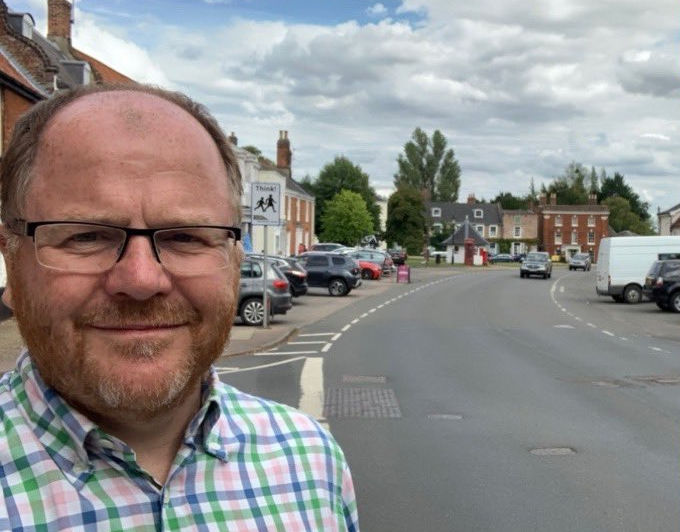
Improving connectivity in our part of the world was one of my first pledges when I began campaigning to become the MP for Mid Norfolk back in 2007.
That’s why I was so proud to play a part, alongside my fellow Norfolk parliamentary colleagues and the A47 Alliance, in securing the £300 million required for the first phase of A47 dualling and improvement schemes – which include the crucial North Tuddenham-Easton stretch.
I was pleased to join Highways England’s A47 Parliamentary Forum this past Friday to receive an update on how the works are progressing, and to continue our efforts to now lobby hard for full dualling of this key route. Full dualling is imperative if we are to improve safety and ensure that Norfolk has the 21st century transport system it deserves. Only then can we unlock the true economic potential of our great county.
Rest assured, I will continue to actively campaign on this issue in the coming months.
